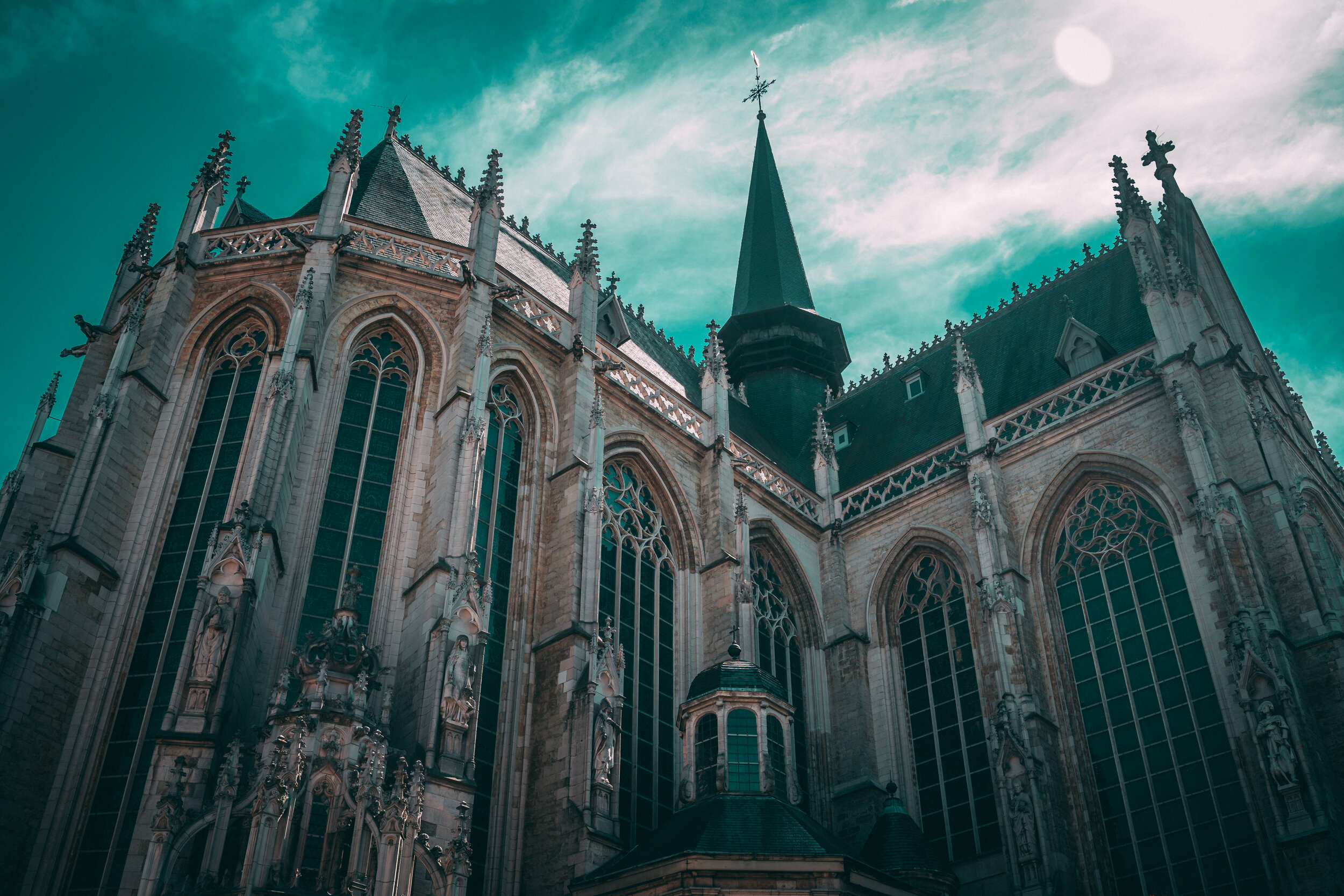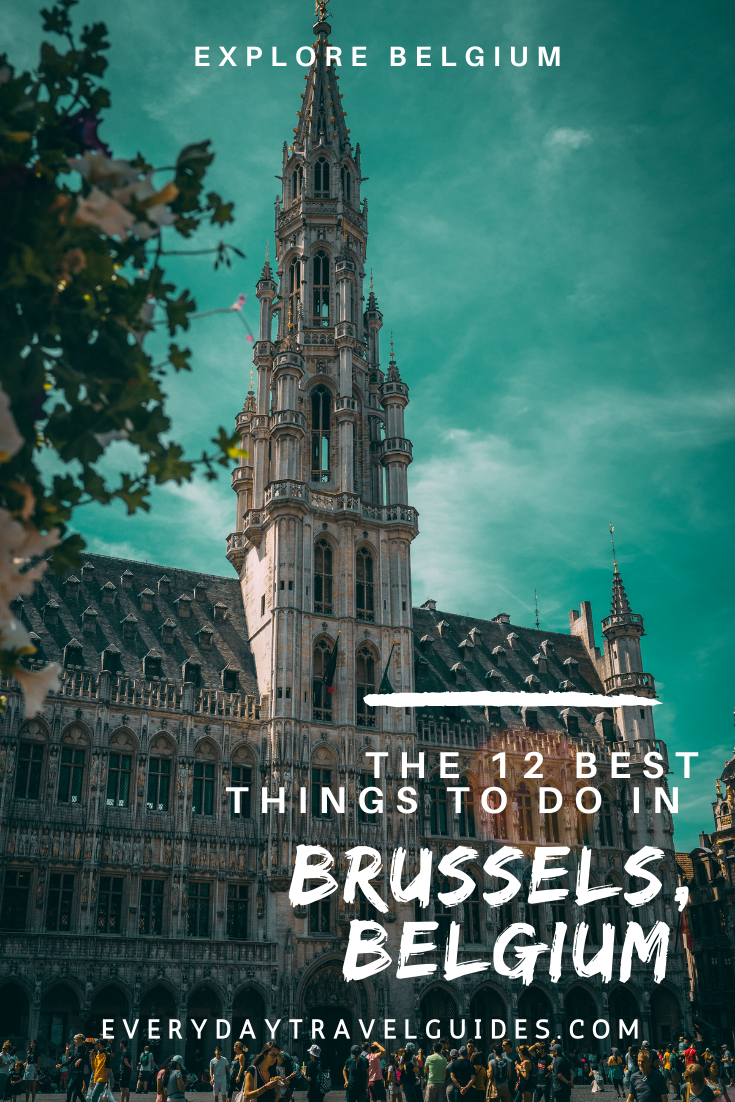The 12 Best Things To Do in Brussels, Belgium
by Rebecca Hollman
updated Nov 6, 2020
Brussels, Belgium
Brussels is the capital city of Belgium and also the de facto capital of the entire European Union. Because of this, it has a very official feel, not unlike Washington DC in the United States. Besides all the official government work and politics, Brussels also has lovely architecture, amazing waffles, and a unique mix of French and Dutch history. A lot of people think that Brussels can be visited and over with in 1 day or less but I think it’s a lovely city that should be explored thoroughly. Check out the 12 best things that Brussels has to offer below and enjoy this unique capital city!
Table of Contents
1. Parc de Bruxelles and Palais de Bruxelles
ABOUT: The Royal Palace is the official palace of the King and Queen of Belgium, however it is not their full time residence. The king and his family live in the Royal Palace of Laeken on the outskirts of Brussels. The palace is free to enter and is an amazingly beautiful building, both inside and outside, worth visiting. Facing the palace, is Brussels Park (Parc de Bruxelles). This huge green space has a cafe, a theatre, and tons of places to sit and relax and enjoy the view of the palace. Close to the palace and the park are tons of museums so it would be a great full day spent walking through the palace, sitting in the park and going to one or two art museums right next door.
Entrance to the palace is free. You have to go through security checks and large bags have to be checked in and left in a secure room. Small bags are allowed.
GETTING THERE: Thankfully Brussels is a very walkable city and most of the top attractions are all very close to the historic downtown center. The Royal Palace and Brussels Park are just slightly southeast of the historic downtown and a 15 minute walk from Grand-Place.
2. St. Michael and St. Gudula Cathedral
ABOUT: The cathedral of St. Michael and St. Gudula is the national church of Belgium and hosts the royal weddings and funerals. It’s most unique feature is its Gothic architecture style. Stained glass and historic architecture makes it a treat for the spiritual and artistic soul. Faith comes in all shades of stained glass. Free entry to the main cathedral, Basement tour is 2 euros.
GETTING THERE: The cathedral is right next to the square of Parc de Bruxelles, only a 15 minute walk from Grand-Place.
3. Grand Place/Grote Markt
ABOUT: Arguably the most famous and most visited destination in all of Brussels, the Grand-Place is a square surrounded by historic governmental buildings. The Grand Place is the most important tourist destination and most memorable landmark in Brussels. It is also considered as one of the most beautiful squares in Europe, and has been a UNESCO World Heritage Site since 1998. It is surrounded by opulent guildhalls and two larger edifices, the city's Town Hall, and the King's House or Breadhouse (French: Maison du Roi, Dutch: Broodhuis) building containing the Brussels City Museum. When the town of Brussels was originally founded, this area was used as a market place for meat, bread, and cloth. The name stuck over the years and it is still called the Grand Market (Grand Place in French and Grote Markt in Dutch).
GETTING THERE: The Grand-Place is the center of Brussels and is considered the heart of downtown Brussels. This is THE center of Brussels.
4. Manneken Pis
ABOUT: Mannekin Pis is an iconic 17th-century fountain with a bronze statue of small boy, peeing out into the fountain below. He is somewhat of a legend in Belgium and he is often dressed up in costumes for different occasions. There is even an entire museum of previous Mannekin Pis costumes. This is just a quick stop to check off that you’ve seen Mannekin Pis yourself and you really don’t need more than 10 minutes to walk by.
GETTING THERE: The Mannekin Pis statue is a short walk from the square of Grand-Place, heading southwest towards the area of Stalingrad.
5. Botanical Garden and Le Botanique
ABOUT: The botanical gardens are a nice oasis in the middle of the city. There are classical gardens dating back to 1826 as well as many sculptures and duck ponds. Entrance to the gardens is free. Le Botanique is a cultural center in a former botanical glasshouse, with regular concerts, art exhibitions & theater.
GETTING THERE: The park is a bit northeast of the historic downtown area, about a 20 minute walk from Grand-Place.
6. The Atomium
ABOUT: The Atomium is a landmark building in Brussels, originally constructed for the 1958 Brussels World’s Fair. It was designed by the famous architects André and Jean Polak. The Atomium depicts nine iron atoms in the shape of the body-centred cubic unit cell of an iron crystal, magnified 165 billion times. Six of the spheres are accessible to the public and are now a restaurant, kids area, event space, and museum.
GETTING THERE: The Atomium is north of the city in the town of Laken. It is next to the Royal Observatory, Laken Park and Mini-Europe. Reaching the Atomium is possible by car, taxi or public transportation. Taking the yellow line from the Brussels Beur train station gives direct access to the Atomium. You would get off at the Esplanade station and walk 11 minutes to the Atomium entrance.
7. Mont Des Arts
ABOUT: Les Monts des Arts is a highpoint that overlooks manicured gardens, the huge spire of the town hall in Grand-Place and on a very clear day the Atomium and Koekleberg Basilica in the distance. People love to sit on the steps here and enjoy the view out over Brussels. There are also lots of street performers that like to entertain here. Stop by for a look of the iconic Brussels sights under the yellow bike art installation.
8. Parc Du Cinquantenaire
ABOUT: The Park of the 50th Anniversary is a park dedicated to Belgium’s 50 years of independence. The iconic triple archway was built in 1905 and is dedicated to 50 years of Belgian freedom. The rest of the park is a great place to relax with manicured gardens. There are also a few museums inside and next to the park including the Royal Museum of Armed Forces and Military History, the Art & History Museum, AutoWorld and La Maison Cauchie Bruxelles.
8. Museum Hopping
ABOUT: Brussels has hundreds of museums spread all across the city, ranging from science to art to prostitution. You could spend weeks in the city and never see all the museums, and you could spend days in the Royal Museum of Fine Arts and never see all the exhibits. I’ve consolidated a list of Brussels locals’ favorite museums, as well as tourist’s favorite museums, so you can get a taste of a little bit of everything: modern art, film making, science, history, and the just plain weird. Purchasing a Brussels Card will give you entrance into almost all of these museums for free and is a great way to save money on admissions.
Royal Museums of Fine Arts of Belgium
Musical Instruments Museum
Magritte Museum
Natural Sciences Museum
Brussels City Museum
Belvue Museum (and Coudenberg Palace)
Cinquantenaire Museum
Belgian Chocolate Village
Belgian Comic Strip Center
GETTING THERE: These museums are spread all across the city so check out the map below which has every museum I’ve listed pinned on here for your convenience.
9. Join a Beer and/or Food Tour
ABOUT: .Brussels is a foodie city and one of the best things to do in the city is eat! There are many free walking tours offered that show off the sights of the city and some of these are specifically food eating walking tours. The most unique Brussels food choices include chocolate, beer, waffles and mussels - a very interesting combo!
Some popular tours include Hungry Mary's Famous Beer and Chocolate Tour - Brussels and Brussels Chocolate Walking Tour and Workshop.
10. Take a Day Trip to Another Town
ABOUT: If you’ve seen enough of Brussels itself, the amazing Belgian train system allows you to easily visit some other smaller towns nearby. All of the following towns would make great day trips from Brussels, or even for a weekend.
Ghent: Quiet town with homes winding along a river and a famous fish market
Bruges: Probably the most popular trip from Brussels and known as the “Venice of Belgium”
Antwerp: A port city with fascinating art and architecture and home to the centuries old Diamond District
Dinant: A lovely town on a river with a beer museum
Moorsel: A village in East Flanders that dates back to the early Middle Ages
Aalst: Very close city to Brussels with lots of art, history and breweries
Tournai: A city that was once under British rule, known for its 12th and 13th century architecture
Hasselt: Belgian town with an impressive 17th century Japanese tea garden
Leuven: Young city known for its breweries and the “longest bar in the world”
Ypres: Important city for the history of WWI with war museums, memorials and battlefields
GETTING THERE: All these towns are easily accessible by train from Brussels Centraal station in less than an hour.
11. Eat Chocolate and Waffles
ABOUT: Chocolate and waffles: the two most iconic Belgian foods. A day in Brussels wouldn’t be complete without eating at the best chocolate and waffle pit stops.
Best chocolate:
Maison Pierre Marcolini
Belvas
Passion Chocolat
Galler Chocolatier
Frederic Blondeel
Atelier Saint Catherine
Choco-Story Brussels (Chocolate Museum)
Best waffles:
Vitalgaufre
Maison Dandoy
Peck 47
The Waffle Factory
12. Galeries Royales Saint-Hubert
ABOUT: The Royal Gallery of Saint Hubert is a beautiful arcade with an intricate and striking domed roof. Inside there are many boutiques selling chocolate, watches, high end clothes, jewelry, and more. The gallery was built by King Leopold in 1847.
GETTING THERE: The gallery is in the heart of the historic downtown area of Brussels and is only a few steps away from the Grand-Place.

















